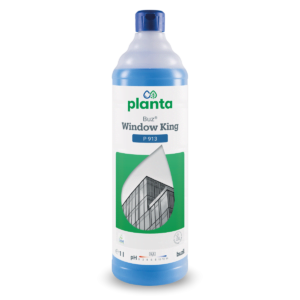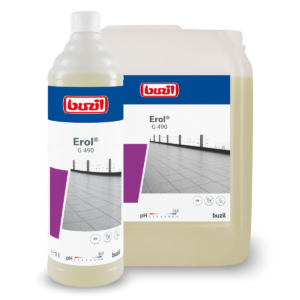Technical Data Sheets
BUZIL_TD_G_507_en-GB (English)
BUZIL_TD_G_507_et-EE (Eesti keel)
BUZIL_TD_G_507_ru-RU (Русский)
Use
pollution
Mineral soiling (lime, cement residue, urine scale, etc.)
Oxidation and adherent contamination (corrosion, incrustations, etc.)
Material compatibility
Ceramic tiles
Stainless steel
Ceramic hobs
Product Information
- Removes tarnish from stainless steel surfaces and appliances
- Creates a beading effect
- Removes even stubborn dirt encrustations
- Excellent lime dissolving power even with heavy dirt
- Halal certified according to © HALAL CONTROL
Area of application
- for use in the food sector
- acid-resistant surfaces
- Stainless steel, ceramic hobs
- ceramic tiles and porcelain surfaces
Application and dosage
Note
- Do not use on acid-sensitive materials, aluminum, painted surfaces, acrylic glass (PMMA) and lime-bound natural stones such as marble or travertine.
- Surfaces or objects that come into direct contact with food must be cleaned of cleaning residues by careful rinsing with water.
- Changes or variations in colour of the product do not impact on the quality. The product image may differ in colour and shape from the original.
Tips and tricks
ow / weak cleaning performance – choose a thick scouring cream, e.g. Buz Polish G 508
Stripes and/or film on the surface – Rinse thoroughly with clean water
grey / matt appearance of the surface due to hard water – clean periodically with Buz Contracalc G 461
Environmental Information
Proportion of easily degradable ingredients 99.7 %
Phosphorus content 0 mg/g
Palm oil-based raw materials – RSPO-certified share contain no palm oil-based raw materials
The proportion of easily degradable ingredients refers to the proportion of organic ingredients that are defined as “easily biodegradable” according to OECD 301 or Detergent Regulation (EC) No. 648/2004. The value of the phosphorus content refers to elemental phosphorus. Palm oil is an important renewable source for the production of raw materials. The Roundtable on Sustainable Palm Oil (RSPO), founded in 2004, promotes sustainable cultivation methods for palm oil. This results in a certification system and the possibility of declaring raw materials as “RSPO-certified”.






Reviews
There are no reviews yet.